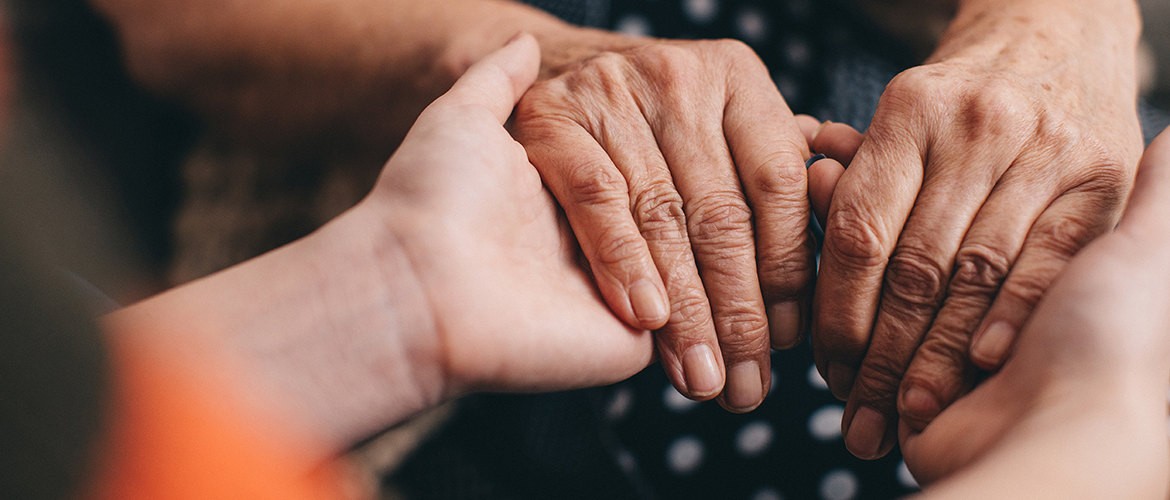Jill Bradley, like many people, has a lot to balance every day.
She’s a manager of learning solutions for Health Care Service Corporation and a caregiver to her teenage son on the autism spectrum.

Jill Bradley, like many people, has a lot to balance every day.
She’s a manager of learning solutions for Health Care Service Corporation and a caregiver to her teenage son on the autism spectrum.
Now that she is working remotely, balancing everything got a little more difficult.
“They don’t have activities to go to, because they’ve been canceled,” she says. “The respite you get from a child going to school or a babysitter is now gone.”
Bradley is among 6.7 million commercially insured members across all Blue Cross and Blue Shield plans who have a spouse or child who needs caregiver support. More than half of them wouldn’t have identified as a caregiver before the COVID-19 pandemic.
“Caregiving right now is universal to everybody because everybody is at home,” says Bradley. “It’s such a stress for so many people.”
Caregivers are 34% more likely to have anxiety and 37% more likely to have depression.
Caregiving is associated with higher rates of physical and behavioral health conditions, the Blue Cross Blue Shield Association’s new Health of America report shows.
Caregivers are 34% more likely to have anxiety and 37% more likely to have depression. And they are 50% more likely to have obesity and 64% more likely to have high blood pressure.
Now more than ever, they need an extra hand.
That’s why HCSC launched a Caregiver Support Program in 2019, staffed by social workers, nurses and behavioral health care managers.
“We created the program to assist family members who have taken on the stressful role of caregiver, because today more than ever we’re living in an era where more people are literally taking care of a loved one before work, going to work all day, and continue to take care of someone after work,” says Susan Laski, divisional vice president of Health Advocacy Clinical Solutions with HCSC.
Members with plans that include Health Advocacy Solutions have access to the Caregiver Support Program. Any time they call, the person on the other end is trained to listen for certain cues that could mean the member may need assistance caring for a family member. The customer advocate can then introduce the member into the Caregiver Support Program, like Lupe Maya Veskovic, a medical management social worker.
Veskovic and her teammates then go to work. They contact the member, listen to their needs and connect them to community resources and support groups that could help.
“Sometimes they don’t know where to start,” Veskovic says. “I tell them, ‘Don’t worry. You don’t have to do anything. I’ll take care of it.’”
She uses a nationwide database of community resources, and her own knowledge, to find local programs and charities that could help the caregiver. Many caregivers are looking for financial resources, local support groups and help finding in-home assistance.
“Navigating through the system to find resources is very cumbersome,” says Laski, especially if someone is already overwhelmed with caregiving and other duties. “Social workers are so, so good at what they do in this area.”
One member Veskovic connected with was caring for her husband, who had Stage 4 cancer. Veskovic identified resources that may be helpful for her — and also lent a listening ear.
“The member would reach out to me for emotional support,” Veskovic says. “She said she just needed to vent.”
When the spouse passed away, the member sent a note thanking Veskovic for being there for her.
“It’s pretty powerful. It makes my job rewarding,” Veskovic says.
Bradley knows how important a shoulder to lean on or a listening ear can be. That’s why, as state chair of the In-Abled Business Resource Group at HCSC, she helped establish a caregiver support group for employees.
The support group, which started in February, now meets virtually once a month. Participants talk about challenges they’re facing as caregivers and how they’re coping.
The first meeting had 15 participants. But, as more people became caregivers because of the pandemic, interest in the support group “exploded,” Bradley says, with more than 150 attendees at the last call.
“People are clamoring for this,” she says. “They need an outlet.”